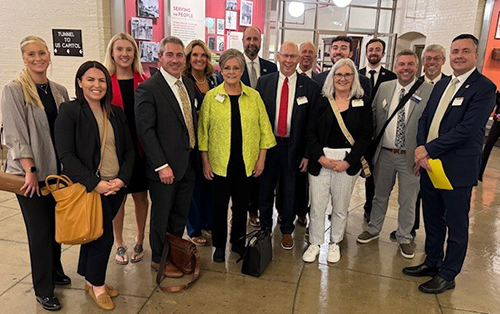 (May 9, 2025) – This week, the American Hospital Association hosted its Annual Membership Meeting in Washington, DC. AHA brings in numerous speakers from across the country to provide attendees with a wide variety of insights and perspectives on the current political landscape, effective advocacy and economic issues. In addition, there were sessions on rural and post-acute care and trustee sessions focused on quality, patient safety and strategic leadership.
(May 9, 2025) – This week, the American Hospital Association hosted its Annual Membership Meeting in Washington, DC. AHA brings in numerous speakers from across the country to provide attendees with a wide variety of insights and perspectives on the current political landscape, effective advocacy and economic issues. In addition, there were sessions on rural and post-acute care and trustee sessions focused on quality, patient safety and strategic leadership.

Kansas hospitals were well represented by four Kansas Hospital Association board members, George Stover, CEO, Rice Community Health, Lyons; Val Gleason, president and CEO, NMC Health, Newton; Bobby Olm-Shipman, president, South and East Region, Saint Luke's South Hospital, Debb Bruner, administrator and CEO, Minneola Healthcare, Minneola, in addition to hospital leaders from AdventHealth, Children's Mercy, LMH Health and The University of Kansas Health System.
On Tuesday, our group went to Capitol Hill to visit with members and staff of our congressional delegation. It's a busy time as people from all over the country meet with their senators and representatives, looking to influence the direction of the forthcoming budget reconciliation bill. For our part, the AHA annual meeting couldn't have come at a better time, as we got the opportunity to discuss the effects that Medicaid cuts would have on Kansas' health care network at the very time the reconciliation bill is being negotiated.
Of primary concern is a rumored five percent cap on state provider tax rates. While no text has been leaked that includes such a cap, other Medicaid cuts, such as lowering Medicaid's Federal Medical Assistance Percentage rate for expansion populations, seem to be coming off the table. Inclusion of some work requirement provision is a near certainty, but that still leaves a yawning gap between the amount this might save and the substantial sum of $880 billion over 10 years that must be cut to meet the bill's requirements. Now that CMS is currently adjudicating Kansas' six percent assessment, we spoke with our delegation about the negative impact such a cap would have on hospitals' budget projections.
We spoke with Senator Jerry Moran, who, on this point, and concerning 340B, agreed that hospitals have come to rely on these mechanisms to keep their budgets whole. He was also sympathetic to our concerns that the Trump Administration's "skinny" budget appeared to zero out important rural health programs like the Medicare Rural Hospital Flexibility Program and the State Health Insurance Assistance Program. He agreed to work with his fellow appropriators to address this when they begin their fiscal year 2026 budget discussions. We also met with Representatives Tracey Mann, Sharice Davids and Derek Schmidt, and were able to reiterate our points on Medicaid while also discussing Medicare Advantage plans as an excellent place for cutting waste, fraud and abuse out of the federal budget. Despite President Trump's insistence that Medicare, including MA, is off the table for the reconciliation bill, we received positive feedback on our concerns about how MA plans continue to reap profits through denials while costing the taxpayer more than traditional Medicare.
We also met with staff from Senator Roger Marshall's and Representative Ron Estes' offices, and MA plans featured prominently in these conversations as well. Senator Marshall continues to lead the way on pushing back against MA plan abuses, most notably related to prior authorization denials. We also spoke with Senator Marshall's staff on our concerns regarding potential, so-called "price transparency" legislation that singles out hospitals while giving passes to insurance plans and drugmakers.
We greatly appreciate KHA members who advocate for these important federal issues, whether in Washington or as members of Congress, and reach out with questions on how their decisions impact your hospital and patients in your community. We encourage our members to continue to tell their stories. KHA staff will continue to keep you abreast on all these political decisions and how they may impact Kansas hospitals and patients.
--Chad Austin